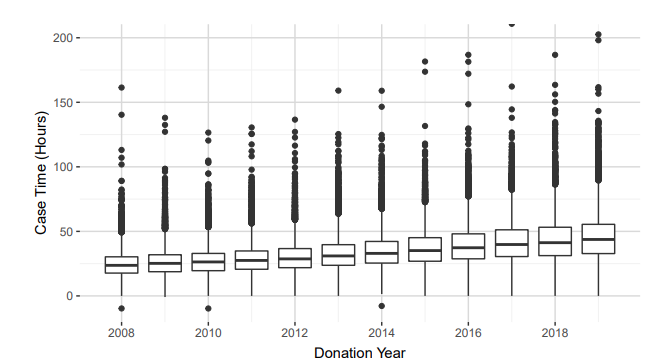Case Times For Brain Dead Donors: Longer Is Not Better, No Impact Of Longer Case Time On Organ Yield Or OPO Performance Tier
1Gift of Life Donor Program, Philadelphia, PA, 2Surgery, Lehigh Valley Health Network, Allentown, PA, 3United Network for Organ Sharing, Richmond, VA, 4Research, United Network for Organ Sharing, Silverdale, WA
Meeting: 2022 American Transplant Congress
Abstract number: 9041
Keywords: Brain death, Cadaveric organs, Organ Selection/Allocation
Topic: Clinical Science » Organ Inclusive » 69 - Non-Organ Specific:Organ Preservation/Ischemia Reperfusion Injury
Session Information
Session Name: Non-Organ Specific: Organ Preservation/Ischemia Reperfusion Injury
Session Type: Poster Abstract
Date: Saturday, June 4, 2022
Session Time: 5:30pm-7:00pm
 Presentation Time: 5:30pm-7:00pm
Presentation Time: 5:30pm-7:00pm
Location: Hynes Halls C & D
*Purpose: Having observed the steady increase in case times, we wished to examine if this has impacted organ yield
*Methods: We conducted a retrospective cohort study to examine the effects of case times and organ yield. Case time was defined as declaration of brain death until crossclamp. All cases of brain death donors with at least one organ recovered for transplant from the SRTR database from 1/1/2008 to 12/31/2019 were included. 91,728 donors were analyzed for the components of case time, donor factors, and transplanted organs. Univariate and multivariable regression analysis was performed to assess factors associated with case time, organ yield, and OPO Performance Tier. 17 cases with case time > 200 hours were excluded.
*Results: Over 12 yrs, median case time rose from 23.68 to 43.73 hours, an increase of 85% (Figure 1). The range of mean case time by OPO was 24.25 (PADV) to 59.65 (CAOP) hrs. OPO’s practices did not change in the interval: those with shorter and longer times in 2008 had shorter and longer times in 2019. Case time was not different by OPO by performance tier and median case time by OPO also was not associated with performance tier. Case time had no effect on organ yield. We examined the impact of case time on organ yield by splitting OPO’s into two groups based on whether their Observed/Expected ratio was >1 or <=1. Although there was considerable overlap, better performing OPO’s do have median case times 4 hours shorter than lesser performing OPO’s (37.83 vs 41.25 hours, p<0.001).
*Conclusions: 1. Case times for brain dead donors are steadily and substantially increasing. 2. Based on analysis of case time components, patterns of practice across OPO’s are highly variable but that variability is not associated with increased efficiency or higher organ yield. 3. Longer case times are not associated with higher organ yield. 4. More complicated donors can lengthen case time (e.g. cigarette use), or the opposite when transplantability is compromised (e.g. diabetes). 5. Case time was not predictable based on donor factors, but rather is variable based on OPO practices . 6. Better performing OPO’s as defined by organ yield (O/E >1) had statistically significantly shorter case times. 7. Case time is not associated with an OPO’s CMS Performance Tier; 11 donor risk factors are associated with OPO Performance Tier. 8. Case time appears to a function of idiosyncratic OPO practices, which may or may not be data-driven but do not impact organ yield
To cite this abstract in AMA style:
Moritz MJ, Hasz R, Nathan H, Hunt E, Noreen S, Toll A. Case Times For Brain Dead Donors: Longer Is Not Better, No Impact Of Longer Case Time On Organ Yield Or OPO Performance Tier [abstract]. Am J Transplant. 2022; 22 (suppl 3). https://atcmeetingabstracts.com/abstract/case-times-for-brain-dead-donors-longer-is-not-better-no-impact-of-longer-case-time-on-organ-yield-or-opo-performance-tier/. Accessed February 27, 2026.« Back to 2022 American Transplant Congress

